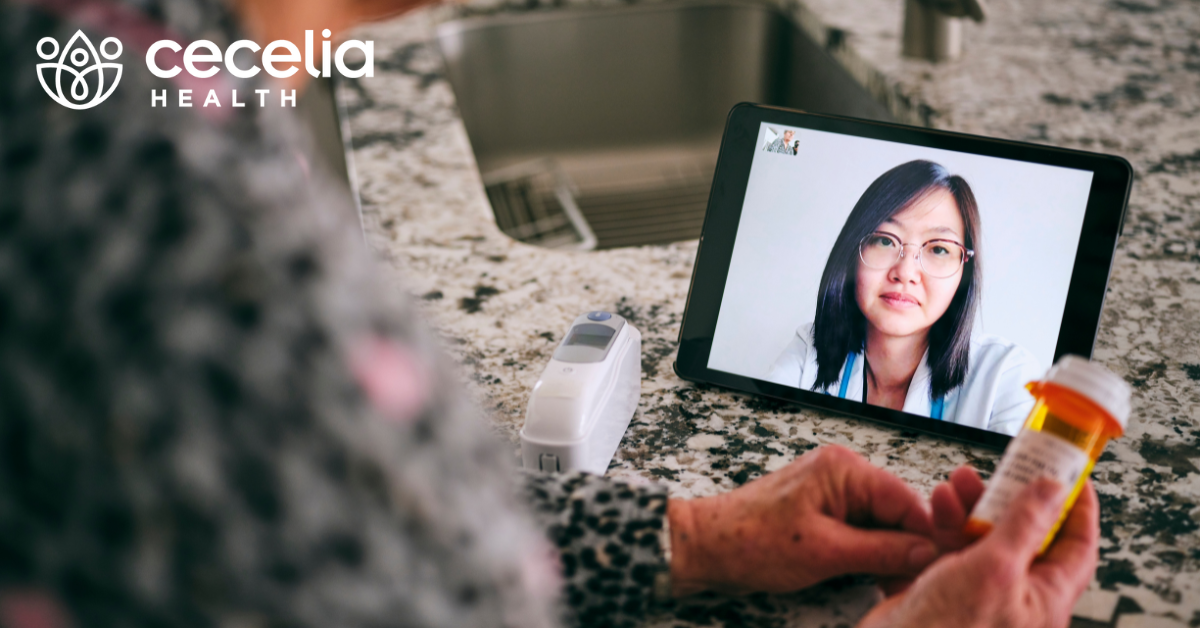Virtual care has become increasingly important in the delivery of healthcare. For your Medicare members with complex medical conditions that require ongoing management, it can be lifesaving.
However, not all virtual care vendors are created equal. To fully engage your population and see long-lasting Medicare health outcomes, power up your chronic care programs with virtual support from licensed clinical experts. How does clinician-led virtual care impact better Medicare health outcomes, including physical and mental health measures?
1. It expands access to quality specialty care from members’ homes
First, virtual care enables individuals to access healthcare from the comfort of their homes. This means older adults who may have mobility issues or those who lack transportation can continue to receive quality care. But the true potential of virtual care goes beyond primary care visits.
Through clinician-led virtual care, individuals get support from a dedicated condition-specific expert. Clinicians can answer questions and provide guidance in those critical moments of daily management required of living with a complex health condition like diabetes. This can also include facilitating escalation to a specialist, such as an endocrinologist, if needed. Undoubtedly, those living in rural or underserved areas have further benefit of seeing virtual clinicians and specialists who may otherwise be in short supply in their geographic location.
2. It encourages sustained engagement through building trusted relationships
It’s one thing to ask your Medicare population to download a health app—which is how some vendors report on engagement—but it’s another to get them to actually use it. The reality is, they are not utilizing these tools. Virtual proactive outreach from an expert clinician, on the other hand, reinforces the need for human connection to drive accountability for sustained engagement.
From the first call, Cecelia Health clinicians—including registered dietitians, certified diabetes care and education specialists (CDCES), registered nurses with cardiovascular expertise, and registered respiratory therapists—begin to build a relationship with each individual. Since older adults are at higher risk for feelings of loneliness and social isolation, often a phone call from a caring clinician can make all the difference to an individual’s level of motivation for improving their health and well-being.
When engaged in scheduled virtual care visits with their dedicated clinician, individuals show up and stay committed to the SMART (a helpful acronym for specific, measurable, achievable, realistic and time-bound) goals set during their sessions. Building on each session, with guideline-supported curriculum, these engaged individuals begin to experience gradual behavior change that turns into sustainable lifestyle changes for better physical and mental health. What’s more, clinicians can push content via email and text to reinforce learnings in between doctor visits!
3. It addresses health equity and connects members to helpful resources
Third, virtual care led by specially-trained clinicians helps uncover and address social determinants of health (SDOH) barriers. Certainly, SDOH can have a significant impact on health outcomes but also directly affects health equity. According to one study—
- One in five seniors cites an inability to pay for care as their top barrier to medical follow-up.
- One in three seniors said grocery assistance is their most important support priority.
- More than 20% of seniors do not have reliable transportation to access medical care.
However, addressing SDOH requires trust and vulnerability that is often lacking in the traditional, more reactive approach to healthcare. Clinician-led virtual care, through developing trusted relationships, provides a comfortable, familiar environment for individuals to discuss their concerns. In fact, Cecelia Health clinicians are trained in motivational interviewing and active listening techniques to have more meaningful conversations. Using these skills can help them to sensitively address SDOH barriers and provide SDOH referrals and community resources to address needs including housing, transportation, and social support.
4. It optimizes personalization across language, cultural, and social needs
Fourth, virtual care enables more personalized care. Regarding preference, clinicians can meet patients wherever they are in any physical setting, whether that’s through video visits or phone calls. Virtual care platforms also allow for flexibility in scheduling and can support asynchronous communication, such as secure messaging.
More importantly, clinicians can meet patients where they are in their care journey and develop a plan that considers their current level of understanding as well as unique needs. Often overlooked are solutions with cultural relevance—including nutrition recommendations that consider personal diet and lifestyle—which can affect one-third of Medicare Advantage beneficiaries who identify as a racial or ethnic minority. Experienced clinical experts with the Cecelia Health team work across a range of demographics as well as cultural and social considerations to provide equitable care regardless of background or resources.
5. It addresses the whole person for better health condition management
Finally, virtual care with expert clinical support activates whole person care. Many of your Medicare members are managing multiple chronic conditions. Did you know one in five adults with five or more chronic conditions are 70% more likely to enroll in Medicare Advantage (compared to those without a chronic condition)? The stress of managing one condition, let alone many, can present a host of difficulties to any patient. Overwhelm, stress, and even more pronounced levels of anxiety and depression can go hand in hand with managing the physical aspects of the health ailment in question. Virtual care programs from Cecelia Health can support individuals with multiple conditions while integrating mental health care into the mix. This can lead to improved outcomes for your Medicare members with diabetes, cardiovascular disease, chronic kidney disease, respiratory conditions like asthma and COPD, and obesity.
Unfortunately, there is no silver bullet to better lifelong health and appropriate chronic care management among Medicare-age populations. Instead, it requires deliberate lifestyle and behavior change, and helping individuals feel empowered in their care is the only way to truly drive better health outcomes. Virtual care is a valuable tool for achieving this goal, and its potential to improve Medicare health outcomes is significant when paired with proactive, clinician-led support.

